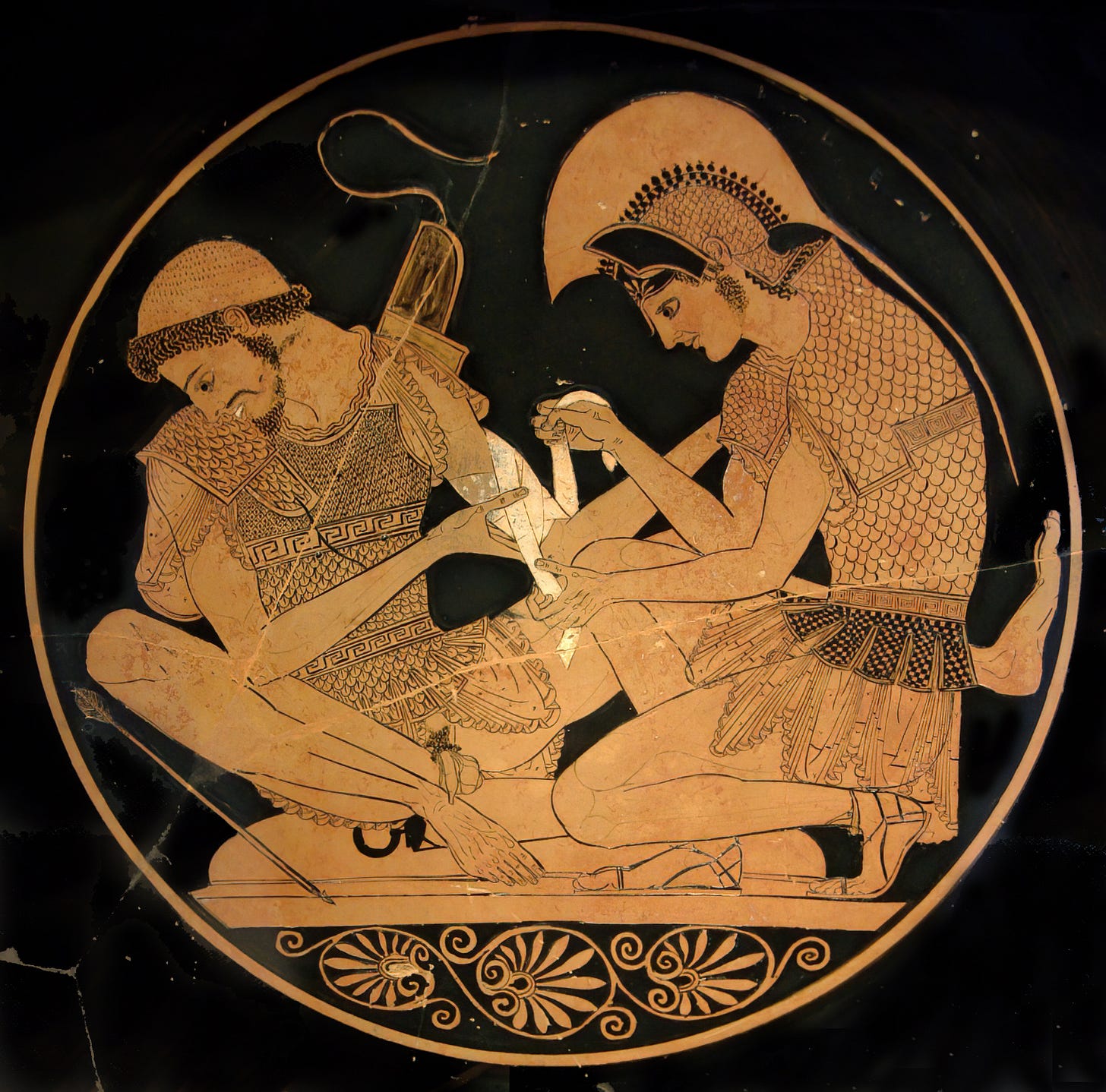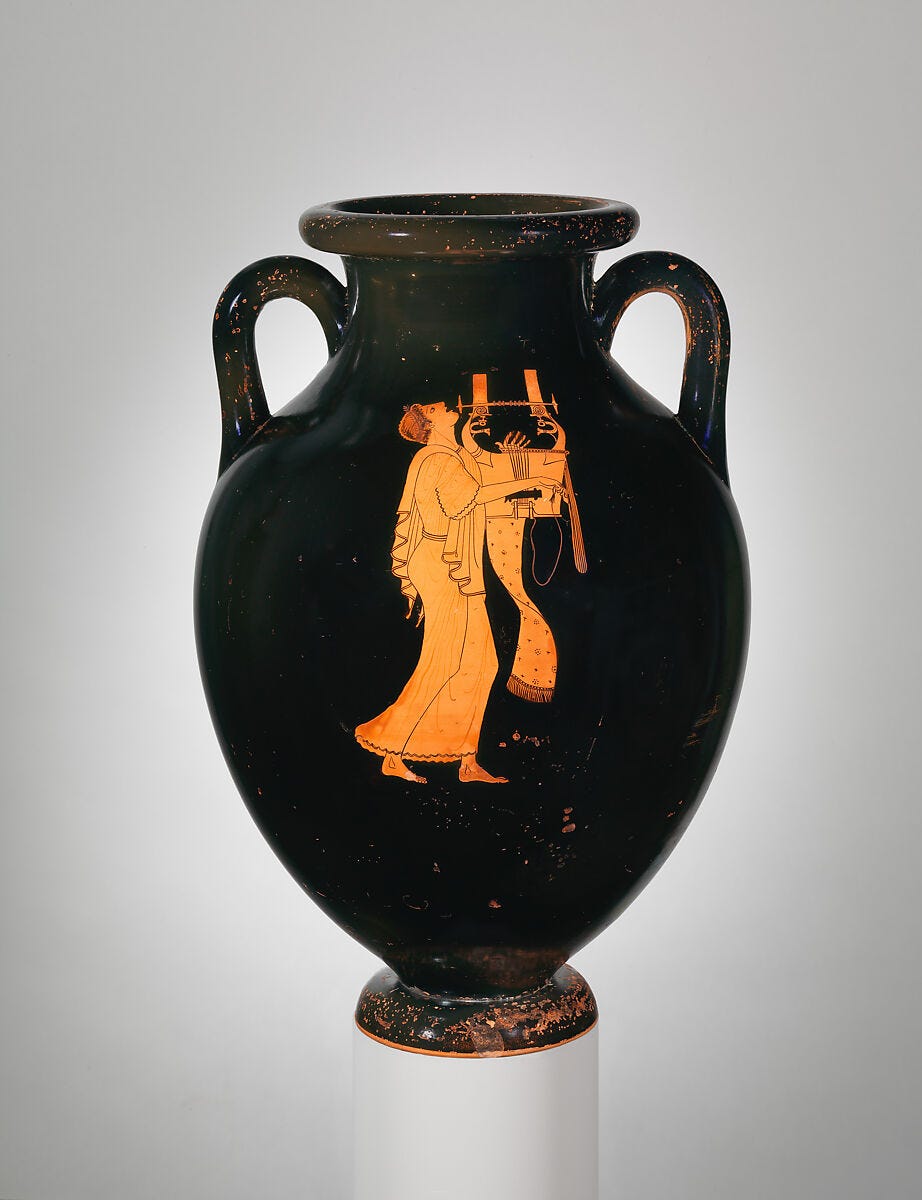At some point last year, Sophia Efthimiatou reached out and started a conversation with me about moving my work at sententiaeantiquae.com to substack. I was interested in exploring the platform, partly because wordpress has changed some of their infrastructure in annoying ways, but also because I am an itinerant tinkerer, happier with starting things, perhaps, than imagining how to finish them.
I came up with the idea of working through the Iliad again for a few reasons. First, Emily Wilson’s new translation of the Iliad brought the epic more into public focus. Second, I found the discussion around the translation sadly divorced from Homeric scholarship and I wanted to create some sort of a resource for new readers interested in engaging in the epic more. And, third, I wanted a project to get back into the Iliad with a depth I had lost in my years away from the epic.
So working on this substack has allowed me to continue a few things I care about in a different context: sharing more of the depth of the past and scholarship about it to a broader community and using the practice of doing so to help me continue learning and expanding my own work. (I have long used blogging as a process for practice and continued learning and for developing projects.)
So the invitation to try out substack also came at time when I was finishing up a book project (more in a few weeks!) and was thinking about next projects. I had spent more than a decade working almost exclusively on the Iliad and then turned quite quickly to a project on the Odyssey that culminated in a book on that epic and modern psychology. I have worked on many Homer related projects, but not writing a book on the Iliad would always gnaw at met.
The breadth and depth of Homeric scholarship is pretty much unrivalled in the humanities. Not only are there numerous modern languages that continue to produce important and critical material about the poems, but the history of Homeric scholarship goes back to the original performance of the texts. To add to this, interdisciplinarity and the continued popularity of heroic myth has produced a staggeringly impressive variegation of commentary on Homer. The task of mere familiarity with scholarly trends is simultaneously Herculean and Sisyphean—so much so that my advisor in graduate school repeatedly told me to find something ‘new’ to write on because the bibliography is just too big.
Alas, I have rarely been one to take good advice. So I somehow made myself into a Homerist. But I spent the first part of my career writing articles to make up for my ignorance and weak spots. Once I spent nearly a decade away from reading all of the new and wonderful scholarship about the Iliad, I had to find a way to get back into it, all while doing the rest of my job.

So, moving forward, I am going to continue posting on the Iliad almost exclusively, focusing on three general areas: (1) highlighting and discussing new scholarship about the Iliad; (2) pursuing a series of themes as I re-read the Iliad in Greek (expressions/reflections/implications of trauma; notions of agency and determinism; hints about performance and reception; ways of thinking about the reception of Homer by diverse audiences); (3) other issues of texts/transmission/and commentary that occur to me.
Areas 2 and 3 are those that have long motivated my online work, but 1 (promoting other people’s scholarship) is something that I came to while working through the substack posts. One of my fundamental frustrations with scholarship is the lack of correlation between the intensity of the labor and the impact our work has. So much Classical scholarship is only read by people who are writing on the same topic in order to publish an article only a handful of people will really read. So much of our work is really good and can enrich the way people understand the past—but it just doesn’t reach a larger audience. So what I hope to do is to discuss an article or book every week to show why it matters and what benefit it offers. (And not in a book review kind of way: I have no intention of criticizing scholarship and will avoid negative comments—I have thrown enough scholarly shade in my day and need to make some amends).
So, starting next week, this substack will continue in these directions. And who knows where it will end.
Here are the 78 posts on the Iliad.
Preparatory Posts
Five Major Themes to Follow in the Iliad
Book-by-book
Book 1
The Politics of Rage: Introduction to Iliad 1
The Plan: Zeus’ Plan in the Iliad
Prophet of Evils: Reading Iphigenia in and out of the Iliad
Speaking of Centaurs: Paradigmatic Problems in book 1
Book 2
From Politics to Poetics: Repairing Achaean Politics in Book 2 of the Iliad
Thersites’ Body: Description, Characterization, and Physiognomy in book 2
Book 3
(Re-)Starting the Trojan War: Iliad 3 and Helen as Our Guide
Heroic Appearances: What Did Helen Look Like?
Suffering So Long for this Woman!: Various Ancient Attitudes towards Helen
Book 4
Backing Up the Future: Characterization and Rivalry in Iliad 4
Better than our Fathers!: Theban Epic Fragments and the Homeric Iliad
Long Ago, Far Away: The Iliad and the So-Called Epic Cycle After the Canon
Book 5
Seeing (and Wounding) the Gods: Reading Iliad 5
All About Athena: Some additional texts for book 5
Two Ways to Decline Zeus: Paradigm, Text, and Story in Iliad 5
Book 6
Structure and Stories: Reading Iliad 6
War Crimes: Iliad 6, Infanticide, and the Mykonos Vase
Mind Reading and Stolen Wits: The Encounter of Diomedes and Glaukos in Iliad 6
Book 7
Divine Plots and Human Plans: Reading Iliad 7
Erasing the Past: The Achaean Wall and Homeric Fame
Give Helen Back!: Trojan Politics in Book 7 of the Iliad
Book 8
Tyranny and the Plot: Introducing Iliad 8
Stranded in Iliad 8 with Nestor and Diomedes: On Reading the Iliad and Neoanalysis
Wishing the Impossible: Hektor in Iliad 8
Book 9
Life, Death, and all the Words Between: Iliad 9 and the Language of Achilles
Two Is Company!: The Duals of Iliad 9 and Homeric Interpretation
Achilles Sings the Hero Within: Stories and Narrative Blends in Iliad 9
Book 10
Night Raids and Gimmick Episodes: Learning to Love Iliad 10
Homeric Redshirts and Iliad 10: Introducing Dolon
Dolon and Achilles; Dolon AS Achilles: Politics and Iliad 10
Book 11
Time, Feet, and Serious Wounds: Starting to Read Iliad 11
The Beginning of His Trouble: Characterizing Achilles in Iliad 11
Insidious Inception?: Nestor’s Speech to Patroklos in Iliad 11
Book 12
Looking Up and Out: Starting to Read Iliad 12
Why Must We Fight and Die?: Reading Sarpedon's Speech to Glaukos in Iliad 12
Scarcity and the Iliad: Thinking about Similes in Book 12
Book 13
The Iliad's Longest Day: Starting to Make Sense of Book 13
Epic Narratives and their Local Sidekicks: On Cretans in Iliad 13
A Heroic Tale Curtailed: Homeric Digressions and Iliad 13
Book 14
What A Dangerous Thing to Say!: Politics and Absurdity in Iliad 14
Where Did Homeric Book Divisions Come From?: Thinking about the thematic Unity of book 14
Falling Asleep after Sex and Other Cosmic Problems: The Seduction of Zeus in Iliad 14
Book 15
Zeus and 'Righting' the Divine Constitution: An Introduction to Reading Iliad 15
Brothers, Sisters, Wives, and Divine (Dis)Order: Setting things Straight in Iliad 15
The Powerful Mind of Zeus: Revitalizing Hektor and the Iliad's Plot
Book 16
There's Plenty of Crying in Epic: Introducing Book 16
Even Zeus Suffers: The Death of Sarpedon and the Beginning of Universal Human Rights
Merely the Third To Kill Me: Hektor, Patroklos, and the End of Iliad 16
Book 17
Rescuing the Bod(ies): Thinking about the Epic Cycle, Neoanalysis, and Introducing Iliad17
A Doublet Disposed: Time Travel Paradoxes and the Death of Euphorbus
Always Second Best (Or Worst): Characterizing Hektor in Iliad 17
Book 18
Things to Do in Ilium When You’re Dead: Introducing Iliad 18.
The Personal Political: Hektor, Polydamas, and Trojan Politics in Iliad 18
The Power to Control the World: Achilles' Shield and Homeric Ekphrasis
Book 19
People Are Going to Tell Our Story: Introducing Iliad 19
Dead and Gentle Forever: Briseis' Lament for Patroklos in Iliad 19
That Other Me: Achilles' Lament for Patroklos in Iliad 19
Book 20
Concerns For Those About To Die: Introducing Iliad 20
Spears and Stones will Break Your Bones But Words Will Always Shape You: Aeneas' Speech to Achilles in Iliad 20
The Gamemaster's Anger and Fear: Homeric Contrafactuals and Rescuing Aeneas
Book 21
What Do You Do With a Problem Like Achilles?: Introducing Iliad 21
You're Gonna Die Too, Friend: Achilles' Speech to Lykaon in Iliad 21
They're Just Not That Into Us: On Mortals and Gods in Iliad 21
Book 22
Hektor's Body and the Burden: Introducing Iliad 22
Laying My Burdens Down: Hektor Sweet-talks Achilles in Iliad 22
A New Widow and Her Orphan: Andromache's Lament for Hektor in Iliad 22
Book 23
That Mare is Mine!: Introducing Iliad 23
Rage Won't Raise the Dead: The Ghost of Patroklos in Iliad 23
Achilles' Wicked Deeds: Framing Human Sacrifice in Iliad 23
Book 24
Disfiguring the Fallow Earth: Introducing Iliad 24
"As If He Were Going to His Death": Priam and Katabasis in Iliad 24
"Blow Up Your TV": Thetis, Achilles, and Life and Death in Iliad 24
Priam And Achilles, Pity and Fear: A 'tragic' end to Homer's Iliad
Starving Then Stoned: Achilles’ Story of Niobe in Iliad 24




